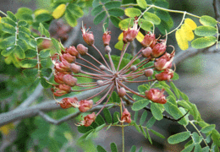Caesalpinia kavaiensis
| Mezoneuron kauaiense | |
|---|---|
 |
|
| Scientific classification | |
| Kingdom: | Plantae |
| (unranked): | Angiosperms |
| (unranked): | Eudicots |
| (unranked): | Rosids |
| Order: | Fabales |
| Family: | Fabaceae |
| Genus: | Mezoneuron |
| Species: | M. kavaiensis |
| Binomial name | |
|
Mezoneuron kauaiense (H.Mann) Hillebr. |
|
| Synonyms | |
|
|
Mezoneuron kauaiense is a rare species of flowering plant in the pea family, Fabaceae, that is endemic to Hawaii. Common names include Uhiuhi (the Big Island and Kauaʻi), Kāwaʻu (Maui), and Kea (Maui). It is threatened by invasive species, particularly feral ungulates.
M. kauaiense is a shrub or small tree that reaches a height of 4–10 m (13–33 ft). The bark is dark grey and made up of rectangular or oblong platelets. The pinnate leaves are composed of 4 to 8 leaflets, each around 3 cm (1.2 in) in length. The bisexual flowers have pink to rose sepals and red anthers. They form on pink to red terminal racemes 4–7 in (10–18 cm) in length. The flat, thin seed pods are 8 cm (3.1 in) long, 5 cm (2.0 in) wide, and contain 2 to 4 oval-shaped seeds. Blooming takes place from December to March.
Uhiuhi inhabits dry, coastal mesic, and mixed mesic forests at elevations of 80–920 m (260–3,020 ft). Associated plants include lama (Diospyros sandwicensis), ʻaʻaliʻi (Dodonaea viscosa), and alaheʻe (Psydrax odorata). Populations formerly existed on Kauaʻi (Waimea Canyon), West Maui, Lānaʻi, the Big Island (North Kona District), and Oʻahu (Waiʻanae Range), but are only found in the latter two today.
...
Wikipedia

